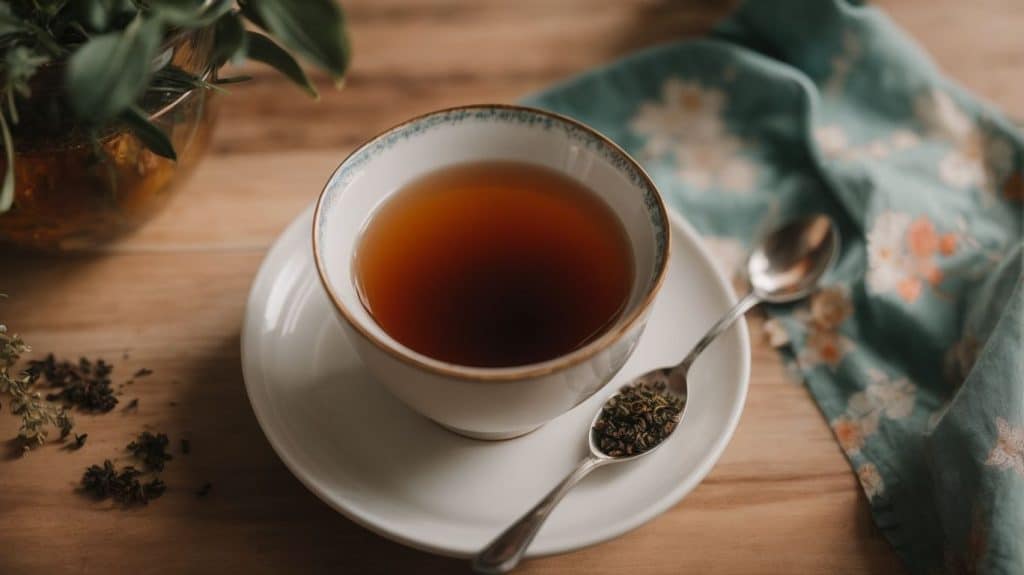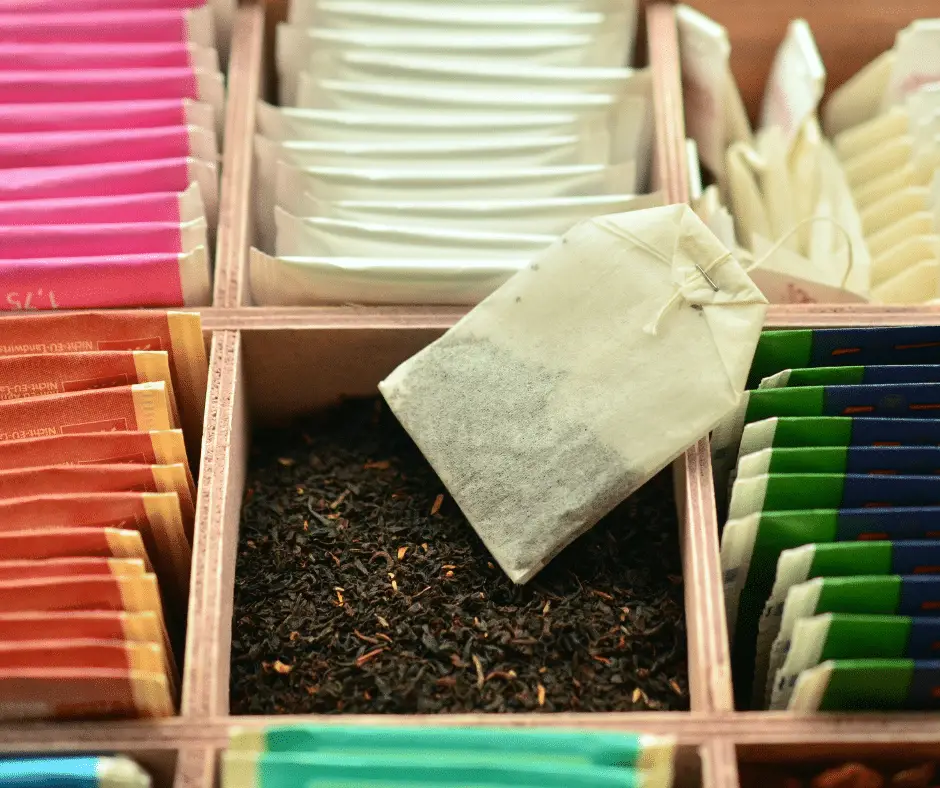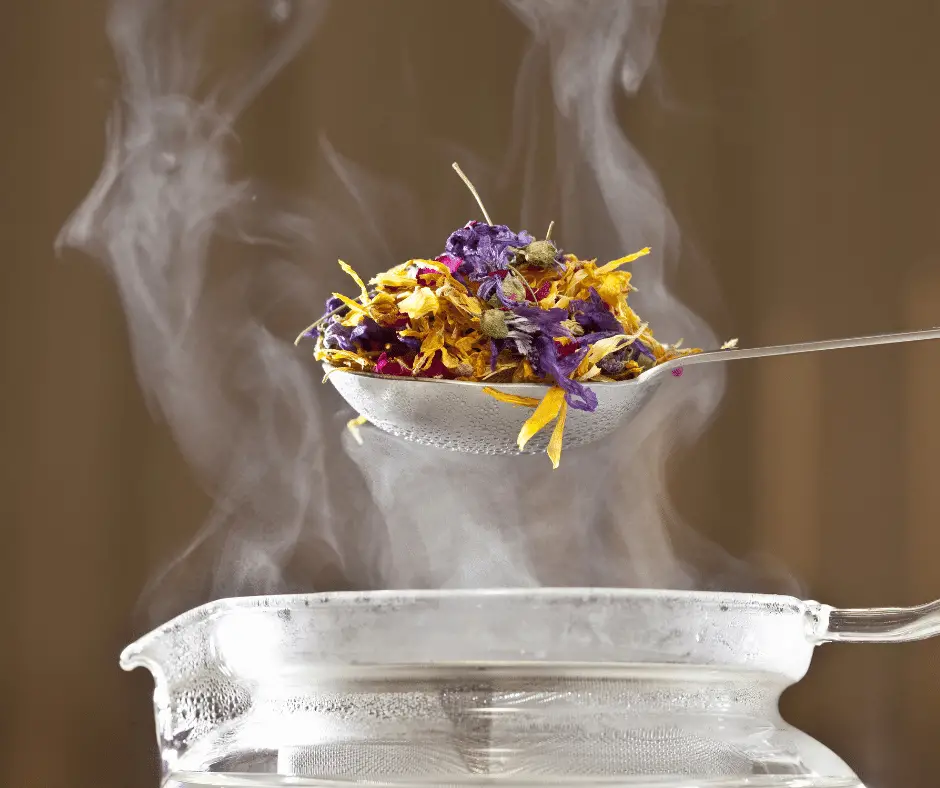There is a common misconception that drinking tea can cause dehydration, but this is not entirely true. Tea is mostly water, which is essential for hydration, but it also contains other components that can contribute to dehydration. The main culprits are caffeine and tannins, both of which are naturally found in tea. However, the type of tea and how it is prepared can also affect its hydration potential.
Caffeine, a stimulant found in tea, can have a diuretic effect, causing the body to produce more urine and potentially leading to dehydration. Tannins, also present in tea, can bind to proteins in the body, reducing the absorption of fluids and leading to dehydration. However, the amount of caffeine and tannins in tea may vary depending on the type of tea and brewing method.
Black tea, which is fully oxidized, typically has the highest caffeine and tannin content, making it more likely to cause dehydration. Green tea, on the other hand, contains less caffeine and tannins and is known for its hydrating properties. Herbal teas, made from various plants and herbs, are caffeine-free and generally hydrating.
Some common signs of dehydration include a dry mouth, dark urine, and headaches. While drinking tea can contribute to dehydration, there are ways to prevent it. One should aim to balance their tea intake with water and make sure to stay hydrated with water throughout the day. Choosing decaffeinated tea or opting for herbal tea can also help prevent dehydration.
In conclusion, while tea contains components that can cause dehydration, it can also contribute to hydration. By being mindful of the type of tea and balancing it with water, one can enjoy the many health benefits of tea without risking dehydration.
Key Takeaways:
Certain components in tea, such as caffeine and tannins, can contribute to dehydration. Black and green teas have higher levels of caffeine and tannins compared to herbal teas, making them more likely to cause dehydration. To prevent dehydration while enjoying tea, balance your intake with water, choose decaffeinated options, and stay hydrated throughout the day. https://www.youtube.com/embed/tfSNBvv5FUk
Can Tea Cause Dehydration?
Tea is a popular beverage enjoyed by many people worldwide, but can it cause dehydration? Despite common belief, tea does not dehydrate the body. In fact, tea is mostly composed of water, making it a hydrating drink. While tea does contain caffeine, a mild diuretic, studies have shown that the amount of fluid lost through increased urination is balanced by the fluid gained from the tea itself. In a study published in the European Journal of Clinical Nutrition, researchers even found that tea had similar hydrating effects as water. So, if you're a fan of tea, you can relax knowing that it won't lead to dehydration.
Now, let's explore a fascinating historical tale in a similar tone of voice. In the nineteenth century, tea became a crucial part of British culture. It was during this time that afternoon tea, a light meal consisting of tea and snacks, was popularized by Anna, the Duchess of Bedford. Legend has it that the duchess experienced a “sinking feeling” during the late afternoon and decided to have a cup of tea and a bite to eat to satisfy her hunger. This simple act soon became a fashionable social event, and afternoon tea became a beloved tradition that is still cherished today.
What Are The Components Of Tea That Can Cause Dehydration?
Tea is a beloved beverage that is enjoyed by people all around the world. However, there has been some debate about whether or not tea can actually dehydrate you. In this section, we will explore the components of tea that may contribute to dehydration. From the caffeine content to the tannins, we will discuss how these elements can affect the body and potentially lead to dehydration. So, let's dive into the science behind tea and its potential to cause dehydration.
1. Caffeine
Caffeine is a natural stimulant found in tea that can potentially contribute to dehydration. However, there are steps you can take to minimize its impact on your hydration levels:
- Stay hydrated: Make sure to drink plenty of water throughout the day to counteract any potential dehydration caused by caffeine.
- Monitor caffeine intake: Limit your consumption of caffeinated tea and consider opting for decaffeinated varieties when possible.
- Moderate consumption: Enjoy tea in moderation to reduce the risk of dehydration from caffeine.
Remember that while caffeine may have a mild diuretic effect, it does not necessarily lead to significant dehydration unless consumed excessively. By maintaining a balanced fluid intake and being mindful of your caffeine consumption, you can still enjoy tea without worrying about dehydration.
2. Tannins
Tannins are natural compounds found in tea that can potentially contribute to dehydration. These astringent substances have the ability to bind to proteins and cause dryness in the mouth. While tannins have been linked to dehydration, their actual impact is still a subject of debate among experts.
Different types of tea contain varying levels of tannins. Generally, black tea has a higher tannin content compared to green tea and herbal tea. However, the effect of tannins on dehydration may also be influenced by factors such as individual tolerance and overall fluid intake.
To prevent dehydration while consuming tea, it is important to balance tea intake with water consumption. Opting for decaffeinated tea can also help reduce the diuretic effect that can contribute to fluid loss. Staying hydrated throughout the day with water is crucial.
Does The Type Of Tea Affect Dehydration?
While tea is often touted as a hydrating beverage, there is some debate about whether certain types of tea can actually cause dehydration. In this section, we will examine the effects of different types of tea on hydration levels. We’ll discuss the potential dehydrating effects of black tea, the potential hydrating properties of green tea, and the varying effects of herbal teas, all in relation to overall hydration levels. So, let’s dive into the world of tea and its impact on hydration.
1. Black Tea
Black tea is a renowned beverage known for its strong taste and potential health benefits. To stay hydrated while enjoying black tea, follow these steps:
- Balance tea consumption with water: Although black tea can contribute to your daily fluid intake, it is important to also drink plain water throughout the day.
- Choose decaffeinated tea: Black tea naturally contains caffeine, which can have a diuretic effect. Consider opting for decaffeinated versions if you are concerned about dehydration.
- Stay hydrated with water: Be sure to drink enough water alongside your black tea to maintain proper hydration levels.
By following these steps, you can savor the bold flavor of black tea while ensuring that you stay properly hydrated all day long.
2. Green Tea
Green tea is a popular beverage known for its numerous health benefits. Contrary to popular belief, consuming green tea in moderation does not cause dehydration. In fact, it can actually contribute to hydration due to its high water content.
To ensure you stay hydrated while enjoying green tea, follow these steps:
- Limit your intake to a few cups per day.
- Stay hydrated with water by drinking plenty throughout the day.
- Monitor your caffeine intake, as green tea does contain caffeine. However, it is lower in comparison to black tea or coffee. If you are sensitive to caffeine, consider opting for decaffeinated green tea.
- If you are concerned about potential dehydration, you can also enjoy herbal teas that do not contain caffeine.
By following these steps, you can enjoy the benefits of green tea without having to worry about dehydration.
3. Herbal Tea
Herbal teas are a popular choice for their various health benefits and lack of caffeine. When it comes to preventing dehydration while enjoying herbal tea, consider the following steps:
- Stay hydrated with water: While herbal teas can contribute to your daily fluid intake, it's important to also drink plain water throughout the day to maintain hydration.
- Choose herbal teas with hydrating ingredients: Some herbal teas, like mint or hibiscus, are known for their hydrating properties. Opt for these types of herbal teas to help support hydration.
- Avoid excessive consumption: While herbal teas are generally safe, it's important to moderate your intake as excessive consumption can have diuretic effects and potentially contribute to dehydration.
It's important to remember that herbal teas, like any other beverage, do not solely determine hydration levels. Factors such as individual hydration needs, overall fluid intake, and environmental conditions also play a role. Listen to your body's thirst cues and adjust your fluid intake accordingly.
What Are The Signs Of Dehydration?
Dehydration can be a serious issue, especially during hot and humid weather. It is essential to stay hydrated by drinking enough fluids throughout the day, but how do we know if we are dehydrated? In this section, we will discuss the common signs of dehydration, including dry mouth, dark urine, and headaches. By understanding these indicators, we can recognize the early signs of dehydration and take necessary steps to prevent it.
1. Dry Mouth
Dry mouth is a common symptom of dehydration caused by consuming tea. To alleviate this issue, follow these steps:
- Drink water alongside tea: Balance your tea intake with water consumption. For every cup of tea, have a glass of water to stay hydrated.
- Choose herbal or decaffeinated tea: Opt for teas that are naturally caffeine-free or have low caffeine content to minimize the diuretic effect.
- Stay hydrated throughout the day: Don't rely solely on tea for hydration. Drink water regularly to maintain adequate hydration levels.
By following these steps, you can prevent dry mouth and ensure proper hydration while enjoying your tea. Remember to listen to your body and adjust your fluid intake accordingly.
2. Dark Urine
Dark urine can be a potential sign of dehydration, which may be caused by various factors, including consuming tea. To prevent dehydration and maintain proper hydration levels, follow these steps:
- Monitor urine color: Urine that is dark yellow or amber in color may indicate dehydration.
- Increase water intake: Be sure to drink plenty of water throughout the day to stay hydrated.
- Limit tea consumption: Reduce your intake of tea, especially those high in caffeine and tannins.
- Opt for herbal or decaffeinated tea: These options typically have lower diuretic effects and can help maintain hydration.
- Balance tea with water: Alternate between drinking tea and water to ensure you are getting enough fluids.
- Pay attention to thirst cues: Whenever you feel thirsty, be sure to drink water to replenish your fluids.
- Consider electrolyte-rich beverages: Including sports drinks or coconut water in your diet can help replenish electrolytes lost through sweating.
- Seek medical advice: If symptoms of dehydration persist or worsen, it is important to consult a healthcare professional.
Remember, dark urine is not always directly linked to tea consumption, but it can be an indicator of dehydration.
3. Headaches
Headaches can often be a sign of dehydration, making it crucial to stay properly hydrated while consuming tea. Here are some steps to prevent dehydration and headaches while enjoying your tea:
- Drink plenty of water: Balance your tea intake by also drinking an adequate amount of water throughout the day. Aim to consume at least eight glasses of water daily.
- Choose decaffeinated tea: Caffeine is a diuretic and can contribute to dehydration, so opt for decaffeinated tea options to reduce the risk of headaches.
- Stay hydrated throughout the day: Don't solely rely on tea for hydration. Make sure to regularly drink water to maintain proper hydration levels.
By following these steps, you can enjoy your tea without worrying about dehydration and potential headaches. Remember to listen to your body and stay hydrated for overall health and well-being.
How To Prevent Dehydration While Drinking Tea?
Tea is a popular beverage enjoyed by many, but can it actually cause dehydration? The answer is not a simple yes or no. While tea itself is not dehydrating, it can contribute to dehydration if not consumed properly. In this section, we will discuss some tips on how to prevent dehydration while enjoying your favorite tea. From balancing tea intake with water to choosing decaffeinated options, we’ll explore the best ways to stay hydrated while still getting your tea fix.
1. Balance Tea Intake With Water
When consuming tea, it's important to maintain a balance between your tea intake and water intake to prevent dehydration. Here are some steps to help you stay hydrated:
- Drink water alongside your tea: For every cup of tea you have, make sure to also drink an equal amount of water. This will help counteract any potential diuretic effects.
- Choose decaffeinated tea: Caffeine can increase urine production and potentially contribute to dehydration. Opt for decaffeinated tea to minimize this effect.
- Stay hydrated throughout the day: Make sure to regularly drink water throughout the day, not just when you're drinking tea. This will ensure that you maintain proper hydration levels.
By following these steps, you can enjoy your tea while still staying properly hydrated.
2. Choose Decaffeinated Tea
When it comes to preventing dehydration while drinking tea, opting for decaffeinated tea can be a helpful strategy. Here are some steps to consider:
- Read labels: Look for teas that are specifically labeled as “decaffeinated.” This ensures that they have undergone a process to remove most of the caffeine content.
- Go for herbal teas: Herbal teas, such as chamomile or peppermint, are naturally caffeine-free and make a great option for hydration.
- Consider flavored decaf teas: Many brands offer decaffeinated versions of popular flavored teas like green tea or black tea. These provide the taste and health benefits without the dehydrating effects of caffeine.
- Experiment with blends: Some tea companies offer unique blends that are naturally caffeine-free or have low levels of caffeine. These can be a great alternative to traditional decaffeinated teas.
- Stay mindful of other ingredients: Check for any additional ingredients or additives that may affect hydration. Opt for teas with minimal or no added sugars or artificial sweeteners.
By choosing decaffeinated tea, you can enjoy a refreshing cup without the potential dehydration effects of caffeine. Remember to stay hydrated throughout the day by drinking water as well.
3. Stay Hydrated With Water Throughout The Day
Staying hydrated with water throughout the day is crucial, even if you enjoy drinking tea. Here are some steps to help you maintain hydration:
- Start your day with a glass of water before consuming any tea.
- Alternate between drinking tea and water throughout the day. For every cup of tea, make sure to also have a glass of water.
- Carry a water bottle with you to ensure easy access to water throughout the day.
- Set reminders to drink water at regular intervals.
- Include hydrating foods in your diet, such as fruits and vegetables with high water content.
Remember, while tea can contribute to your overall fluid intake, water should still be the main source of hydration throughout the day.
Bottom Line
While it is true that tea contains caffeine, which is a diuretic, the overall impact of tea on hydration is still positive. The bottom line is that tea does not significantly dehydrate you. In fact, studies have shown that the fluid intake from tea can contribute to your daily hydration needs. Additionally, herbal teas, which are caffeine-free, can be an even better choice for hydration.
It's important to note that the amount of caffeine in tea varies depending on the type and brewing time. Green and white teas generally have lower caffeine content compared to black tea. So, if you're concerned about caffeine's potential diuretic effects, you can opt for caffeine-free herbal teas such as chamomile or mint.
Ultimately, incorporating tea into your hydration routine can provide various health benefits, as long as it is consumed in moderation. The bottom line is that tea can be enjoyed as a hydrating beverage.
Ongoing Research
Tea is often consumed for its hydrating properties, and the ongoing research surrounding whether it can actually cause dehydration is of great interest. While tea does contain caffeine, which is a mild diuretic, studies have shown that the amount of fluid lost through increased urination is still less than the amount of fluid gained from drinking tea. Furthermore, the high water content in tea can contribute to overall hydration. However, the effects of tea on hydration may vary depending on individual factors such as the type and strength of the tea, as well as an individual's hydration needs and tolerance to caffeine. More research is necessary to fully understand the impact of tea on hydration levels. In the meantime, it is important to listen to your body and consume tea in moderation as part of a balanced hydration routine.
Wake Up Call
When it comes to staying hydrated, tea is actually a great choice. While it does contain caffeine, which can have diuretic effects, the overall impact of tea on hydration is positive. The high water content in tea helps replenish fluids in the body, and it also offers additional health benefits such as antioxidants and phytochemicals. So, feel free to enjoy your morning cup of tea without worrying about dehydration.
Now, let me share a true story that serves as a wake-up call. A close friend of mine used to rely heavily on energy drinks to get through the day. However, one day he experienced severe dehydration and had to be rushed to the hospital. This experience made him realize the importance of proper hydration. He decided to switch to drinking herbal tea and noticed a significant improvement in his overall well-being. This story serves as a reminder of the importance of staying hydrated and making healthier choices, such as opting for tea instead of sugary energy drinks.
How To Brew The Perfect Cup Of Tea
To brew the perfect cup of tea, follow these steps:
- Boil fresh, filtered water. Different types of tea require different water temperatures, so refer to the packaging or guidelines for the specific type of tea you're using.
- Warm the teapot or cup by rinsing it with hot water, then discard the water.
- Add the appropriate amount of tea leaves to the teapot or infuser. Typically, one teaspoon of loose tea leaves per cup is recommended.
- Pour the hot water over the tea leaves and let it steep for the recommended time. This can vary from 1-5 minutes depending on the type of tea.
- Once the tea has steeped, remove the tea leaves or strain the tea into a cup.
- Enjoy the perfect cup of tea as is or add sweeteners, milk, or lemon according to your preference.
To enhance your tea experience, consider experimenting with different tea varieties, adjusting steeping times to suit your taste, and exploring the world of tea accessories like teapots, infusers, and tea brewing gadgets.
Summary
Tea is not dehydrating and can actually help with daily hydration. While it may have a diuretic effect due to caffeine, the benefits of hydration from tea outweigh any potential effects. Research has shown that moderate consumption of caffeinated beverages, such as tea, does not lead to significant dehydration. Since tea is mostly made up of water, it can be a good source of hydration. Herbal teas, which do not contain caffeine, are also a great option for increasing hydration without the diuretic effects.
Frequently Asked Questions
Can drinking tea cause dehydration?
There is conflicting information about whether tea dehydrates or hydrates the body. Some studies claim that tea, especially caffeinated tea, can lead to minor dehydration. However, others argue that the overall hydration benefits of tea may outweigh any potential water loss. It is important to listen to your body and drink enough water to prevent dehydration, especially if you are consuming high amounts of caffeine or engaging in physical activity.
Does iced tea dehydrate you?
It turns out that iced tea, like any other type of tea, can contribute to minor dehydration due to its caffeine content. However, this can vary depending on the type of tea leaf and the individual's sensitivity to caffeine. It is important to pay attention to your body's signals and drink enough water to stay hydrated, especially if you are consuming iced tea in hot weather or during physical activity.
Is there mixed messaging about tea and dehydration?
Yes, there are contradictory articles on the topic of tea and dehydration. Some sources claim that tea can lead to water loss and dehydration, while others argue that the overall hydration benefits of tea outweigh any potential water loss. The verdict is not clear-cut and may depend on individual factors such as caffeine sensitivity and overall water intake.
Can drinking tea help reduce blood pressure?
Some types of tea, such as green tea, have been found to have a positive effect on reducing blood pressure. This is due to the presence of amino acids and antioxidants in tea, which can have a calming effect on the body and promote relaxation. However, it is important to consult with a healthcare professional before relying on tea as a treatment for high blood pressure.
Is there a difference between dehydrating and diuretic teas?
Diuretic teas are those that promote the production of urine, which can lead to water loss and potentially minor dehydration. However, not all types of tea have this effect. Some teas, such as herbal teas, are not diuretic and can actually help with hydration. It is important to pay attention to the specific type of tea you are consuming and listen to your body's signals to avoid dehydration.
Can drinking enough water prevent dehydration?
Yes, drinking enough water is the key to avoiding dehydration. The recommended goal is to drink eight cups of water, or just under two liters, per day. It is important to consider factors such as activity levels and environmental climate when determining your daily water intake. Dark yellow urine, dry mouth, and feeling thirsty are all signs of dehydration, so it is crucial to listen to your body and stay hydrated.

.jpg)


